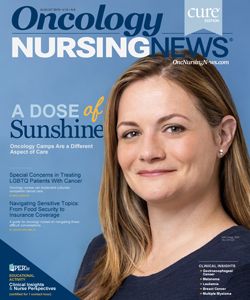Training Nurses to Help Patients Manage Financial Toxicity
Research shows that not addressing the contributing factors of financial toxicity creates distress, anxiety, and depression and threatens a patient’s optimum health.
With a cancer diagnosis, there are myriad complex financial issues that may impact patients, their families, and caregivers. In 2013, researchers coined the term “financial toxicity” to refer to the financial adverse effects induced by the cost of cancer treatment.1 Research shows that not addressing the contributing factors of financial toxicity creates distress, anxiety, and depression and threatens a patient’s optimum health.2-5
Nurses can play a role in helping patients mitigate or manage the financial toxicity of a cancer diagnosis by ensuring they have access to critical information about cancer-related rights and resources. With this information, patients can make educated decisions about their work, finances, and insurance coverage, which are 3 key contributors to the financial toxicity of a cancer diagnosis.
Getting and keeping adequate health insurance coverage is the primary means to minimizing financial toxicity. Nurses can help uninsured patients get enrolled in health insurance coverage and for those who are insured, nurses can help make changes to their coverage to lower their out-of-pocket costs and improve the adequacy of coverage moving forward.
For individuals with a new diagnosis or who are still in treatment, there are ways to minimize expenses and access financial assistance options. Those who have completed the bulk of their cancer care may be most concerned with managing medical bills and rebuilding their credit. Individuals who have triaged most of the financial impact of their diagnosis and treatment may be more focused on adopting long-term financial strategies.
A cancer diagnosis may have significant shortand long-term effects on employment and income for patients and caregivers. A patient with a new diagnosis has employment options that might vary based on their situation. These include working through treatment, working part time, taking time off, making a career change, filing for short- or long-term disability benefits to replace their wages while taking time off, resigning, or retiring. Caregivers are also often faced with employment decisions.
The inability to work and the subsequent loss in income can contribute to the financial burden of a cancer diagnosis. Nurses can point individuals with cancer and their caregivers to 3 key places to look for information about their employment rights and benefits:
• Federal and state employment laws
• Employment contracts
• Employment policies
Having a better understanding of their employment rights can help individuals continue to work or maintain their income, while taking time off from work, through:
• Short- or long-term disability insurance policies purchased directly from an insurance company or offered by their employer
• State disability insurance programs
• The 2 federal long-term disability programs: Social Security Disability Insurance and Supplemental Security Income
For patients facing financial toxicity, Triage Cancer, a national nonprofit organization that provides education on practical and legal issues for cancer survivors and caregivers, offers an Insurance and Finance Intensive program. The program is a free full-day training with in-depth information on health and disability insurance and managing finances after a diagnosis. For nurses and other healthcare professionals, the organization also offers an array of Quick Guides and checklists that can help steer financial-related conversations with patients. Triage Cancer also hosts CancerFinances.
org, an interactive site that helps people navigate their finances after a cancer diagnosis and connects them to financial assistance.
Additionally, Triage Cancer offers a series of animated videos on key topics, from choosing the right insurance plan to managing adverse effects at work.
Data show patients aren’t being connected to available resources to help with these issues.1 Nurses can help bridge that gap. But if nurses wait for the day that a patient asks for help with one of these issues, that day may never come, because many people don’t even know what questions to ask, let alone that their healthcare team might have the answers or know where to find them. As research continues to demonstrate the impact of cancer-related financial toxicity and show that health literacy and health insurance literacy are prime factors in access to quality healthcare and improved health outcomes, Triage Cancer will continue to provide free education for patients, caregivers, and healthcare professionals.
References
- Zafar SY, Abernethy A. Financial toxicity, part I: a new name for a growing problem. Oncology (Willison Park). 2013;27(2):80-81, 149.
- Zafar SY, McNeil RB, Thomas CM, Lathan CS, Ayanian JZ, Provenzale D.Population-based assessment of cancer survivors’ financial burden and quality of life: A prospective cohort study. J Oncol Pract. 2015;11(2):145-150. doi: 10.1200/JOP.2014.001542.
- Ramsey SD, Bansal A, Fedorenko CR, Blough DK, et al. Financial insolvency as a risk factor for early mortality among patients with cancer. J Clin Oncol. 2016:34(9):980-986. doi: 10.1200/JCO.2015.64.6620.
- Lathan CS, Cronin A, Tucker-Seeley R, Zafar SY, Ayanian JZ, Schrag D. Association of financial strain with symptom burden and quality of life for patients with lung or colorectal cancer. J Clin Oncol. 2016;34(15):1732-1740. doi: 10.1200/JCO.2015.63.2232.
- Kale HP, Carroll NV. Self-reported financial burden of cancer care and its effect on physical and mental health-related quality of life among US cancer survivors. Cancer. 2016;122(8):283-289. doi: 10.1002/cncr.29808.
- Rechis R, Reynolds KA, Beckjord EB, Nutt S, Burns RM, Schaefer JS. “I Learned to live with it” is not good enough: challenges reported by post-treatment cancer survivors in the Livestrong surveys: a Livestrong report. Livestrong website. d1un1nybq8gi3x.cloudfront.net/sites/default/files/what-we-do/reports/LSSurvivorSurveyReport_final_0.pdf.

Innovative Program Reduces Nurse Turnover and Fosters Development
Published: September 12th 2024 | Updated: September 12th 2024The US Oncology Network (The Network) has developed one of the most comprehensive programs in the nation to support the professional development and retention of new oncology nurses.


